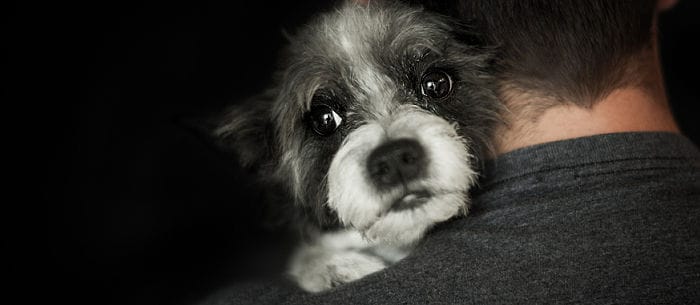If your dog had just been diagnosed with canine lymphoma, you probably have a lot of questions and concerns. What is this disease? How can you help your dog?
Canine lymphoma is one of the most common cancers diagnosed in dogs. Lymphomas originate from white blood cells that work as part of the immune system to protect your dog’s body from infection. Though they can affect any area of the body, lymphomas typically start in the lymph nodes and then spread to other organs, such as the spleen and liver.
Canine lymphomas are similar to non-Hodgkin’s lymphomas that occur in humans, according to Purdue University’s College of Veterinary Medicine. Some progress quickly and are life-threatening, while others are slow-moving and can be easily managed.
As with cancer in humans, treatment options for your dog include chemotherapy, surgery and radiation. The hope with any treatment is that your pooch will go into remission, meaning the cancer has been reduced or completely eliminated. A veterinarian can help you determine your dog’s prognosis based on his type of lymphoma and treatment options.
If your dog has been diagnosed with canine lymphoma, don’t despair. Although it’s a tough road to travel with your pup, there are things you can do to make his life as happy and healthy as possible.
Here are some tips from real pet owners who’ve been there:
- Get Help
A good veterinarian can help calm your mind, because you’ll know that your pet is receiving the highest quality care. “Know that there is help available,” says Gillian Kocher, a publicist at Alex’s Lemonade Stand Foundation, who lost her Bernese mountain dog, Tucker, after a 10-month battle with the disease. “I found a wonderful doctor who was aware of my feelings, but also most concerned with how Tucker was doing,” she says. Seek out a qualified veterinarian oncologist with experience treating lymphoma.
- Know That Chemotherapy Isn’t as Hard to Undergo for Pets as It is With Humans
“The treatments in humans can be extremely harsh. For Tucker, it wasn’t like that at all, because the goal was remission, but also quality of life,” says Kocher. After each treatment, Kocher was amazed to see Tucker return to his normal and happy self. “He would go through ups and downs with treatments, but the worst thing that would happen was loss of appetite or diarrhea — things that could be managed with medication,” she says.
- Feed Him What He Will Eat
Once your pup starts treatment, he’ll need to keep up his appetite, for stamina. “I was told to let him eat whatever he wanted when his appetite was good,” says Tracey C. Jones, the president of Tremendous Life Books and the owner of Mr. Blue, a 13-year-old Australian shepherd basset hound mix who lost his battle with lymphoma in 2014. “He loved animal crackers and baby food.” The key is getting nutrients into your pooch, so pull out all of his favorites. If you’re going to be at work during the day, make sure your dog sitter knows your pup’s favorite foods so he can still have company and treats until you return home.
- Don’t Give Up Hope
Just because your dog has received a diagnosis of lymphoma doesn’t mean his time is over. “I honestly went from thinking I was going to have to put my dog down to see him bounce back and really live for six more months. It wasn’t as long as I would have hoped, but I wouldn’t give up that time for anything,” says Kocher. Remember all lymphomas are different, so be sure to talk to your veterinarian about your own pet’s prognosis.
- Be Positive
“Your dog picks up on your energy. If you start moping, it will affect him,” says Dee Aherne, owner of Lulu, who is undergoing his third round of chemotherapy at Animal Medical Center in New York City and is doing well nearly four years after diagnosis.In fact, Aherne noticed that after her family found out their dog had cancer and became deeply distraught, Lulu, who had been acting fine up until that point, started acting sick. When the family perked up, so did Lulu. “It’s really important to be in the moment because your dog can tell if you’re upset,” reminds Aherne.
- Enjoy Your Time Together
“Tucker and I enjoyed every day, went for walks, ate dog-friendly ice cream, went to watch the kids’ soccer games and more,” says Kocher. Spend time doing whatever your dog loves to do the most, whether it’s playing fetch or snoozing on the sofa. Seeing your dog happy will help lift both of your spirits.
- Practice Gratitude
Though it isn’t easy to be positive when your dog is handed a cancer diagnosis, try to be thankful for the moments you share with each other. “It was the hardest 10 months of my life, filled with unbelievable highs and lows, but I wouldn’t trade a second of it,” says Jones.
If your dog is diagnosed with canine lymphoma, try to focus on just being there for her. Stay by her side as she undergoes treatment, and do your best to stay positive and appreciate the small things that make life sweet for both of you.
And read 12 Common Dog Cancer Symptoms.
Rebecca Desfosse is a freelance writer specializing in parenting, family and pet care topics.
* This article is for general informational purposes only. It is not intended nor implied to be providing medical advice and is not a substitute for such advice. The reader should always consult a health care provider concerning any medical condition or treatment plan. Neither Care.com nor the author assumes any responsibility or liability with respect to use of any information contained herein.


